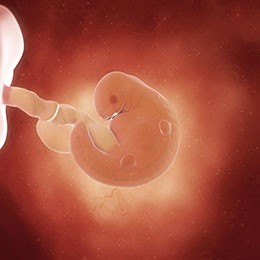Already, your baby is receiving nutrition and oxygen through your placenta. This will continue to pass them nutrients from you and oxygen throughout the next eight months.
Your baby’s developmentBaby is as big as a small pea


Your baby’s development
Your baby has doubled in size over the last week and is now about 8mm long.
Their heart has formed distinct right and left chambers and beats somewhere between 150-160 times each minute, circulating blood around their developing body.
Your baby’s cells are highly responsive to the nutrition they receive at this important time of development. Recent science shows that their lifelong health is only partly determined by genetics and that external factors have a huge part to play.
Your Body
Your progesterone levels are rising and you may start to experience morning sickness. If you’re feeling nauseous, try to eat smaller meals more often. Before you get up in the morning, snack on something plain such as a dry cracker to help settle your stomach.
Want to know more? Call us on 1800 842 098 or Live Chat now.
Please note: These pregnancy week-by-week articles, are meant to give you a general sense of the growth and development going on within you. However, it’s important to remember that every baby develops differently, even during pregnancy.





